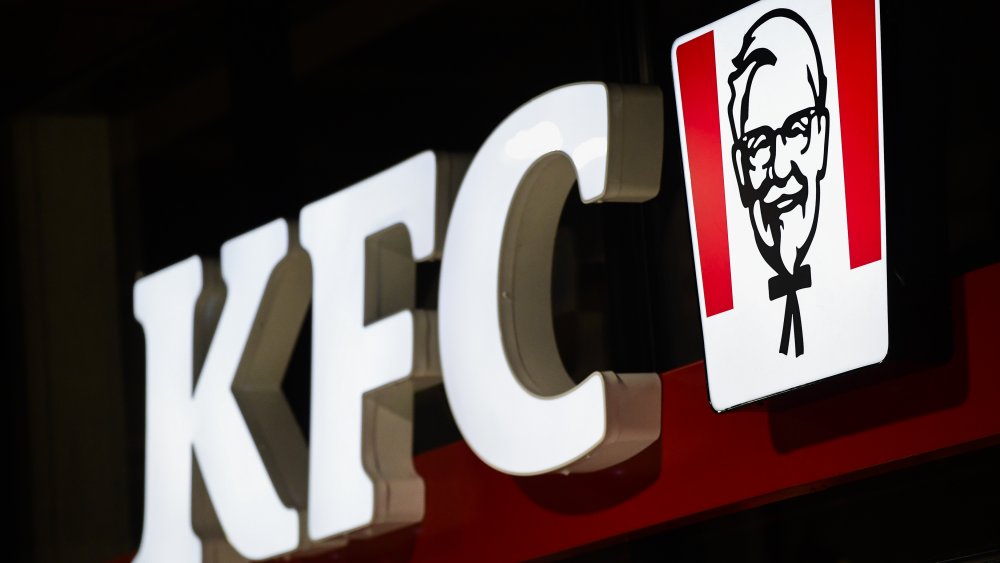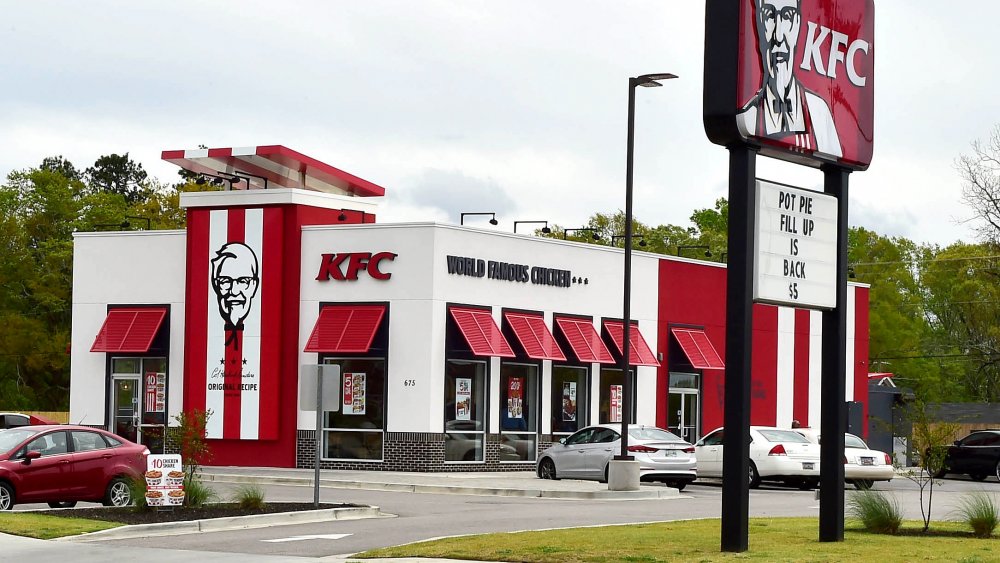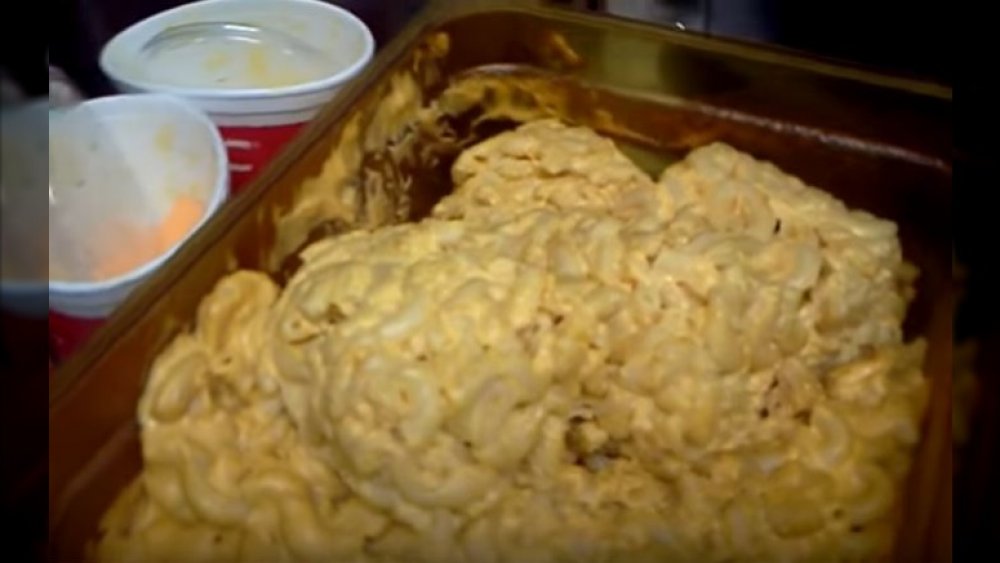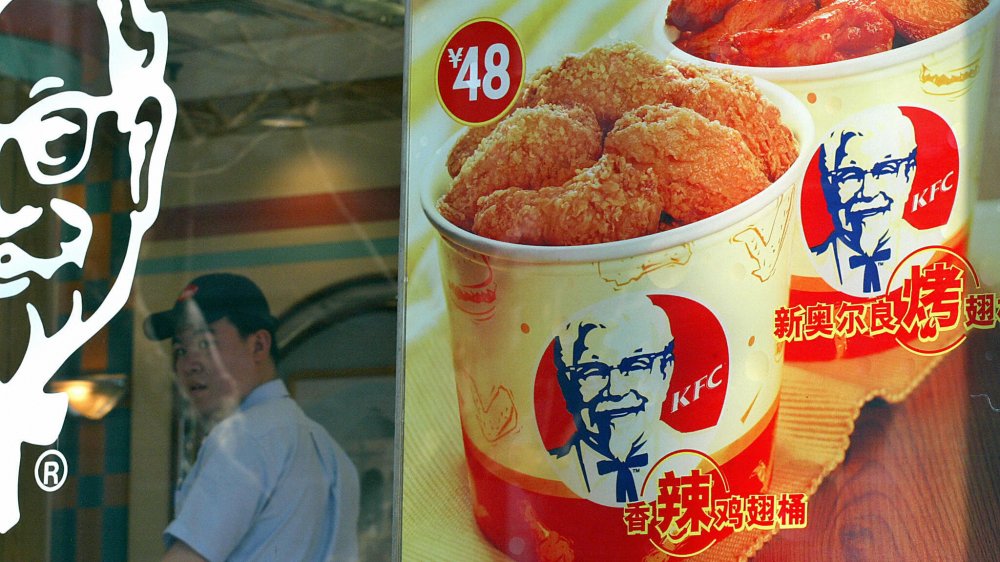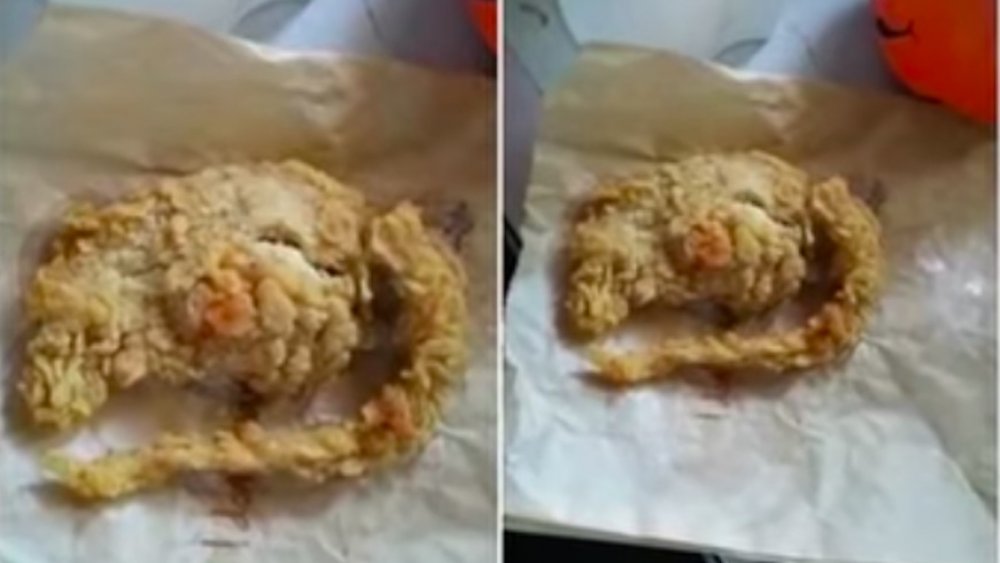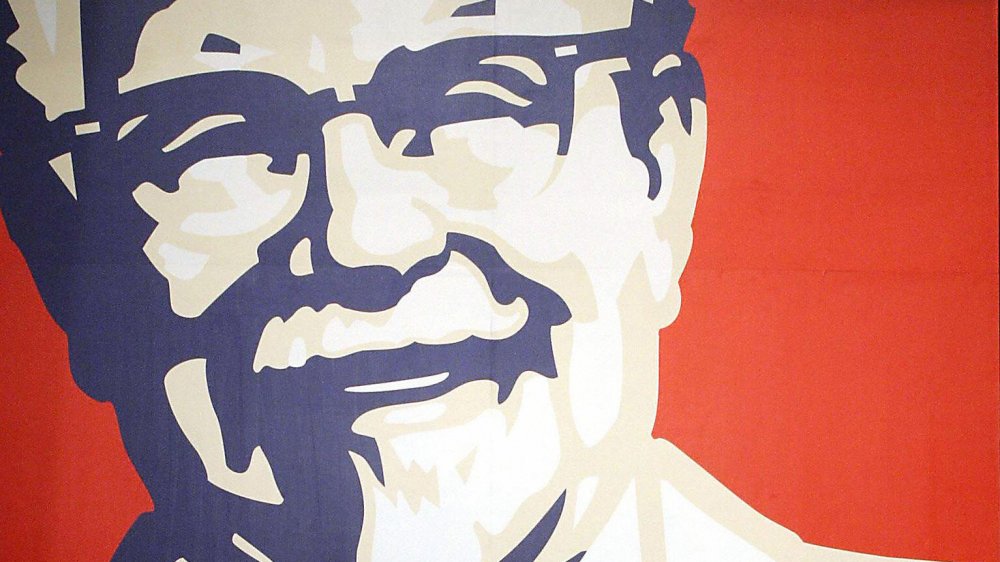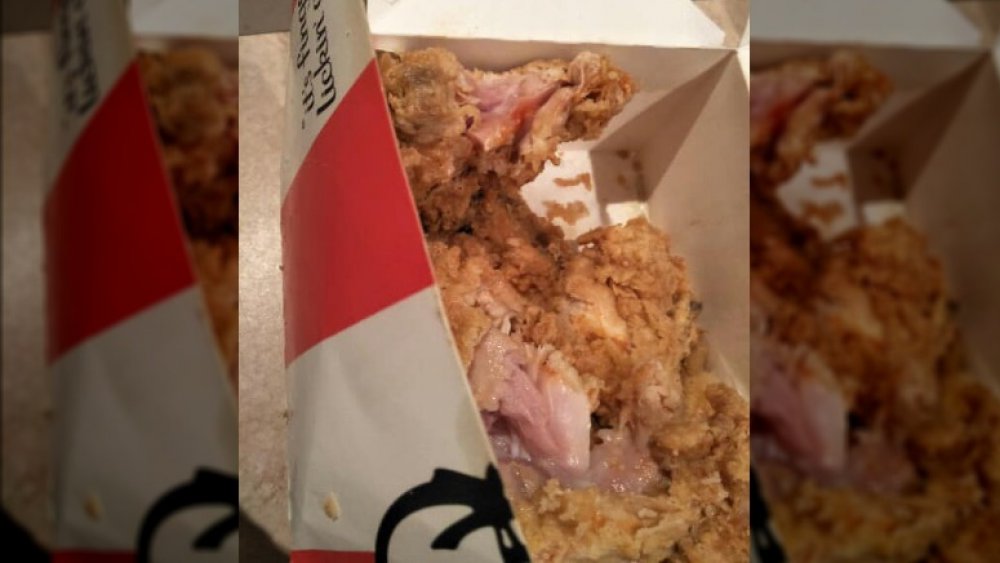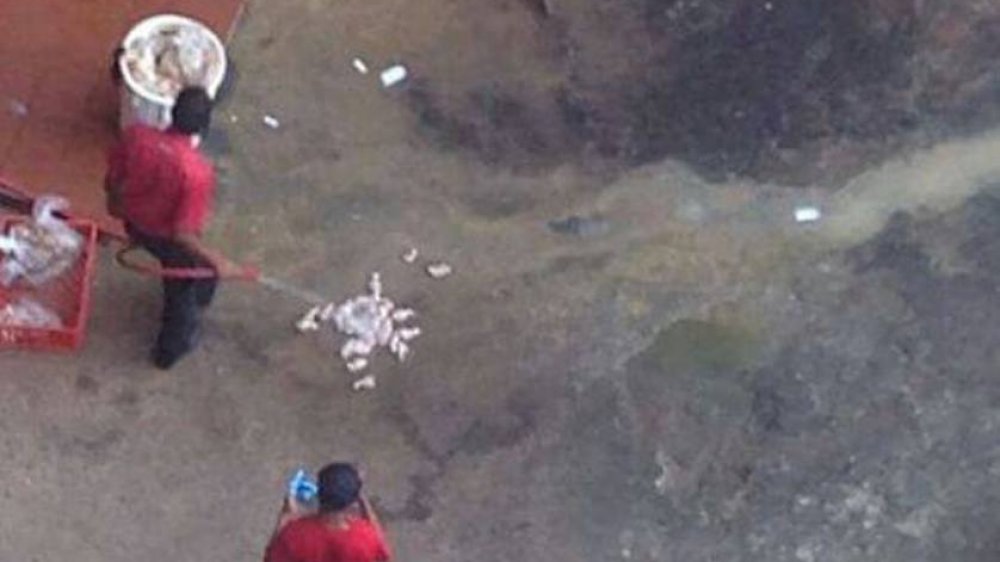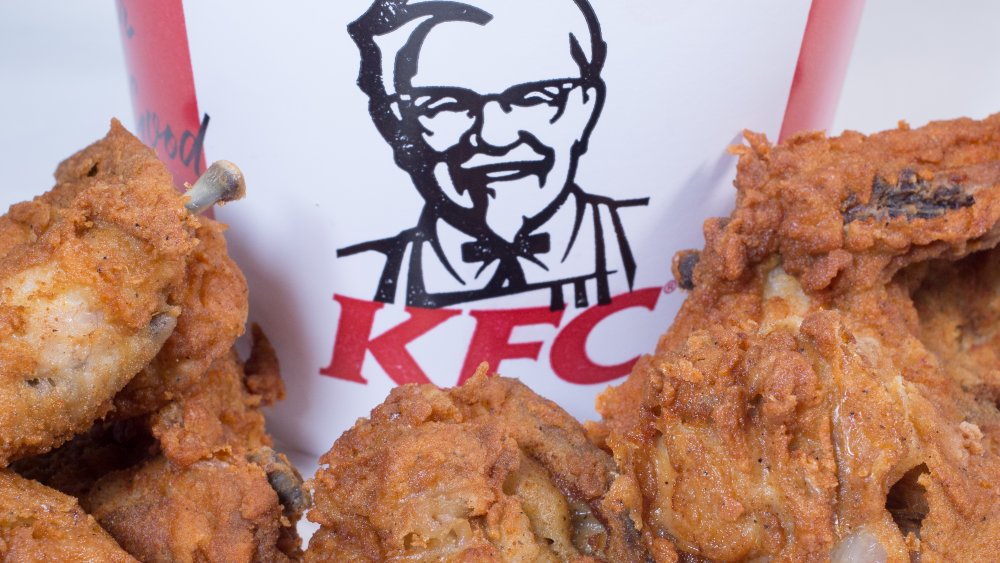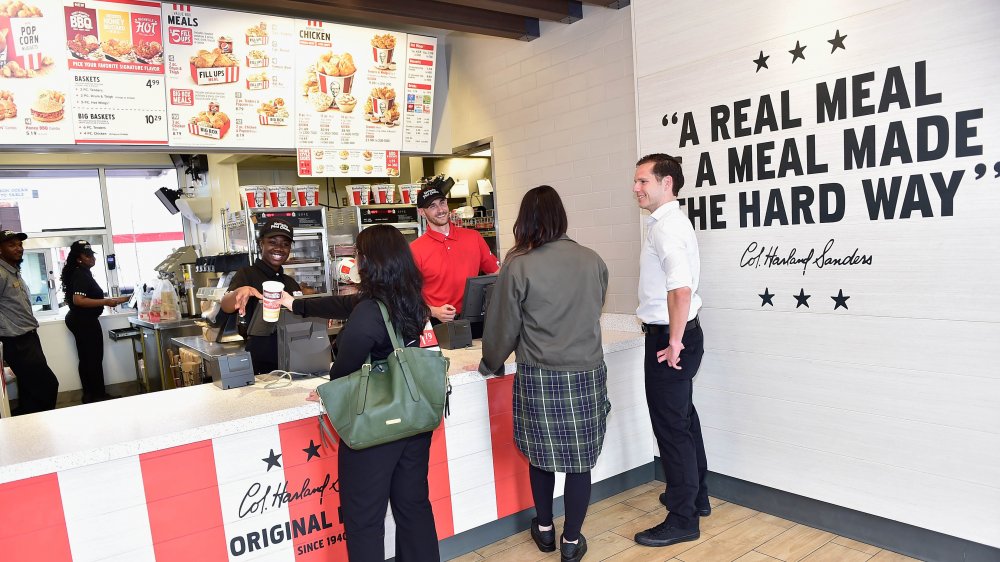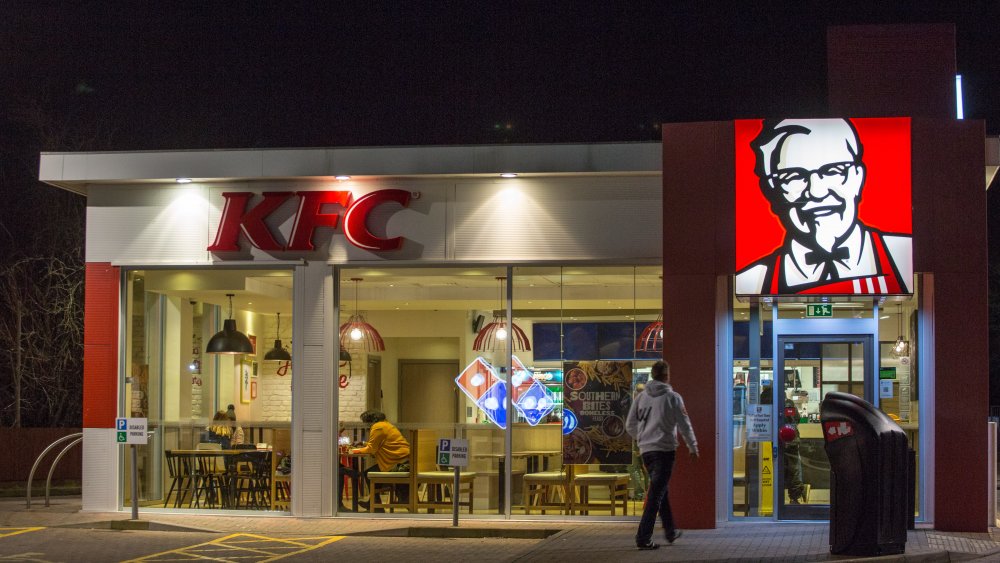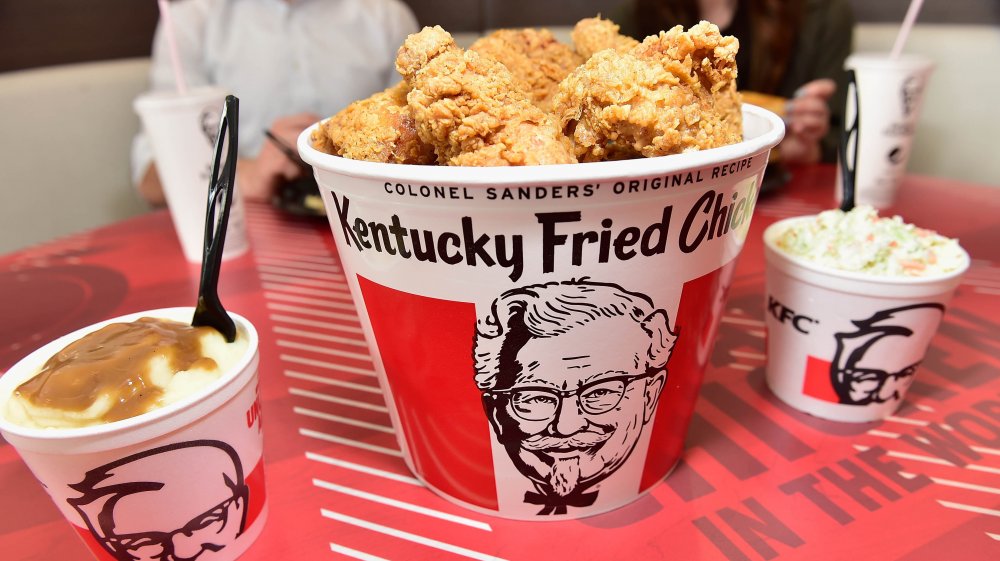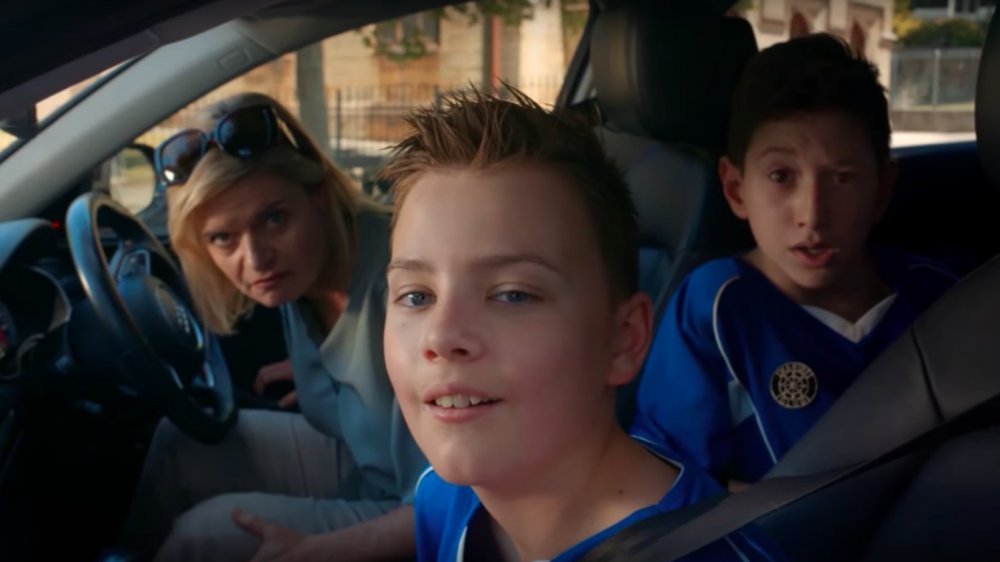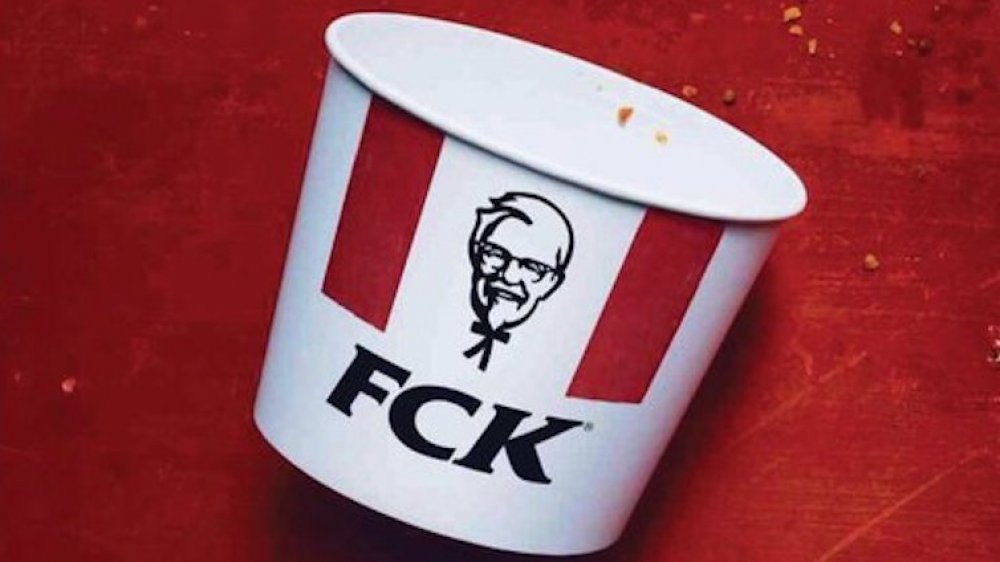The Biggest Scandals To Hit KFC
There have been countless scandals involving fast food chains over the decades, from the infamous McDonald's lawsuit over piping-hot coffee, to claims that Burger King restaurants in Europe had been passing off horse meat as hamburger. Scandals come and scandals go, yet one truism remains: people still love their fast food, scandals be damned. Sure, these controversies may harm business temporarily, but the public's memory can be painfully short — especially when they take place at one of their favorite burger spots or chicken joints.
KFC has certainly not been immune to similar problems, and there have been many over the years. Ranging from a tainted meat scandal in China that sent profits plunging, to unfounded allegations that Kentucky Fried Chicken founder Colonel Sanders was a racist, KFC has weathered its share of PR firestorms.
For anyone who may have forgotten about some of the fried chicken chain's more controversial moments, here's a chance to take a fresh look at some of the biggest scandals to ever hit KFC.
KFC was accused of growing mutant chickens
There are plenty of urban legends involving fast food, and KFC found itself targeted with a particularly weird one when bogus rumors resurfaced in 2014 that KFC had been genetically modifying chickens to create bigger, meatier birds. That rumor evolved into fake claims that the company's rebranding from Kentucky Fried Chicken to KFC was legally required because the mutant creatures they were frying up were technically not chickens.
Although Snopes easily debunked the rumors, Fortune reported they became so prevalent in China that KFC's parent company, Yum! Brands, sued three Chinese tech firms for allowing doctored photos of these monstrous (but entirely imaginary) creatures to proliferate on its social media platforms.
In a statement, the Xuhui District People's Court claimed the three companies had "damaged KFC's reputation" and "caused it economic losses" by allowing the rumors to be spread by its users. According to Reuters, Yum! Brands won the lawsuit, but was only awarded a small fraction of the damages sought. Nevertheless, a KFC spokesperson said the company was "pleased with the outcome."
KFC workers repackaged old food in viral video
A 2013 video shot in a KFC kitchen showcased an employee taking mac-and-cheese and green beans he says "have been there three or four days" and repackaging the food to be served to customers the next day. "I want the world to know this is what we do after we close," the KFC staffer says, dumping the beans from to-go containers into plastic buckets. "Then we feed it to the customers. It's cross-contaminated."
The video went viral again in 2017, several years after it was originally posted on YouTube. With this unfortunate blast from the past back in the public consciousness, KFC had no choice but to issue a statement trying to distance the chain from the actions of its rogue former employees, and to reassure customers that their policies and practices have improved since the filming.
"This video was filmed many years ago and does not reflect our standards or food handling procedures," a KFC spokesperson said in a statement, according to International Business Times. "It, unfortunately, resurfaces online from time to time, often tagged as various locations inaccurately. The actions of those former employees was unacceptable."
KFC China experienced an expired meat scandal
Yum! Brands, which owns such fast food chains as KFC, Taco Bell and Pizza Hut, was rocked in 2014 by a news story that originated in China. As Shanghai Daily reported, a TV journalist went undercover in a factory owned by Shanghai Husi Food Co. — which supplied meat to Yum!-owned fast food restaurants throughout China — and captured footage of employees mixing old expired meat with fresh meat.
Shanghai authorities, reported BBC News, ordered Husi to suspend all operations, while the Shanghai Municipal Food and Drug Administration announced it would "investigate claims of the alleged use of expired raw food material production and the processing of it in food."
The repercussions were severe; Reuters reported that 10 employees involved in the scheme received prison sentences, while Husi's U.S. parent company, OSI Group, was fined more than $300,000. China Daily subsequently reported that Yum! Brands, including KFC, experienced a 16 percent drop in sales in the wake of the scandal.
A KFC customer claimed he was served a rat
Back in 2015, CNN reported that a customer at a Los Angeles KFC received a serious shock when he opened up his box of food and dug into the order. What he saw inside was horrifying: a piece of chicken that appeared to have a small rodent-like body and long, thin tail. On closer inspection, the diner made a stunning allegation: he had been served a Kentucky Fried Rat.
Photos of the alleged rat sure did support the assumption, with the shape and apparent tail certainly fitting the bill. After the disgruntled diner went public with his rat claims, KFC investigated and tested the alleged rodent. When the results were in, KFC issued a statement to ABC describing the results. "Recently, a customer questioned the quality of a KFC product, and this received considerable publicity given the sensational nature of his claim," read the statement. "The customer's attorney turned over the product in question for testing at an independent lab, and the results officially confirmed what KFC knew all along — the product was chicken and not a rat as he claimed."
KFC's founder was accused of being racist
When Papa John's founder John Schnatter was forced to resign after admitting to using a racial slur (and then subsequently apologizing for it), he tried to take KFC's founder Colonel Sanders down with him as a twisted way of attempting to justify his own racist language. According to a Forbes report, Schnatter tried to downplay his culpability by allegedly complaining that "Colonel Sanders called blacks [the N-word]." The point Schnatter was trying to make: Colonel Sanders never faced any backlash for his alleged racism, yet he did.
However, the family of the late Colonel Harland Sanders — who founded Kentucky Fried Chicken in 1952 and died in 1980 — denied the fast-food trailblazer ever used racist language. In an interview with the Louisville Courier Journal, the Colonel's grandson, Trigg Adams, blasted Schnatter's assertion as "an absolute lie." Furthermore, he described the ousted Papa John's founder as "a weasel."
According to Adams, Schnatter's accusation is simply a case of projecting his own bad behavior onto someone else. "Because he's prejudiced, he's trying to say somebody else was, too," Adams added. "[Sanders] had absolutely no prejudice against anybody."
KFC allegedly served a customer raw chicken
In August 2019, Rosi Lancaster picked up some chicken from a KFC restaurant in Annadale, Australia, and was horrified when she began eating and realized it was a tad undercooked — or, to be more precise, completely raw inside. She took to Facebook and shared photos of the vile-looking pink meat that had been hidden beneath KFC's signature crispy coating. "Purchased on Friday from KFC Annandale," she wrote in the caption. "Rang immediately after. The girl on the phone seemed interested and asked me to email photos through and they would call back. No call back yet and no response..."
Once Lancaster's Facebook post went viral, racking up thousands of comments, KFC finally issued an apology. "We're very sorry to hear about this as it doesn't meet our very high standards of food safety and we have been in touch with the customer to offer a full refund," read a statement obtained by Fox News. "We're also currently in the process of undertaking a full review of the incident to understand what has happened."
A video showed KFC employees hosing down chicken
KFC customers in South Africa were beyond disturbed after photos emerged that appeared to feature a serious breach in food safety, taken at a KFC outlet in Braamfontein, a suburb of Johannesburg. In the pics, reported South Africa's Independent Online, KFC employees are seen hosing down numerous pieces of chicken sitting on the ground. After the video and screenshots of the hose-down quickly went viral, horrified customers assumed the chicken was being washed so it could be reused and sold. As the controversy grew, the store shut down while KFC investigated.
However, KFC insisted that whatever people thought they saw in those photos, there was nothing shady taking place. KFC chief executive Jason Kerr told The Star that the chicken was thrown away because it was not fit for consumption, and that employees were simply removing the breading. The reason, he explained, was that the staffers feared they'd be punished for breading chicken that had already been identified as being "imperfect." According to Kerr, "The team members are not to blame because no harm was done to the consumers."
Pamela Anderson accused KFC of cruelty
Actress Pamela Anderson has long been an animal rights activist, and has been a vocal member of People for the Ethical Treatment of Animals (PETA) for decades. In 2008, the former Baywatch star took aim at KFC to blast the fast food chain for the alleged treatment of its chickens. In association with PETA, Anderson presented a pretty horrifying video along with the launch of a companion website, KentuckyFriedCruelty.com. According to Anderson, when it came to the Colonel's famed secret recipe, "the main ingredient is cruelty."
In the video, Anderson showcases an array of startling footage of chickens enduring horrific conditions, allegedly shot at a slaughterhouse that supplied chickens to KFC. Anderson and PETA used the video to call out the fast food chain for using chicken from such a facility. It wasn't the first time Anderson had attacked the chain, either. In fact, she'd been calling for a boycott of the chain for nearly a decade at that point, even visiting restaurants personally to protest.
When news of the video's production broke, KFC tried to head things off by telling the Associated Press (via E! News) "We have an independent panel of outside experts who set our high standards... They are the same standards that all our competitors use to insure humane treatment around the country."
Anderson's protests may not have stopped KFC in their tracks, but it likely convinced a few customers to think twice before ordering one of their buckets.
A KFC customer's chicken turned out to be a paper towel
In 2014, a 7-year-old boy in Newcastle, England, was enjoying the KFC chicken that his stepmother, Krystal Henderson, picked up for him when he bit into a piece that was hard as a rock. Upon inspection, Henderson discovered the chicken wasn't chicken at all. It was, reported The Express, a piece of blue paper towel that had apparently been deep fried.
As Henderson pointed out, "the blue roll could have been used for anything — it could have bleach or disinfectant on it," or it could have been "used to wipe the floor... To give that to a child, I felt so guilty even though it wasn't my fault. For a child to bite into that is horrendous."
To make matters worse, when Henderson returned to the restaurant to complain, she was told to phone the customer service line. Eventually, KFC issued an apology and a refund. "We're very sorry for Ms. Henderson's experience and apologized to her immediately, as well as giving her a refund at the time of the incident," a KFC spokesperson told The Express, adding that staff at that location had been retrained "on our stringent food preparation procedures."
KFC surmised "The blue tissue has most likely originated from a tissue roll used for KFC hygiene purposes," which they say likely fell into the batter undetected.
KFC was ordered to pay $8 million for inflicting brain damage on a 7-year-old girl
Australian youngster Monika Samaan was 7 years old in 2005 when she allegedly ate a KFC chicken wrap that forever changed her life. As the Sydney Morning Herald reported, Samaan's family claimed the chicken gave the child salmonella poisoning so severe that it sent her into a coma, ultimately resulting in severe brain damage and confining her to a wheelchair. Samaan's family sued KFC, which denied responsibility and challenged the allegation that their chicken was responsible for the salmonella poisoning.
The judge in the case felt differently. When the ruling was finally made in 2012, the family was awarded $8 million in compensation, in addition to legal costs. After the court victory, the family's lawyer, George Vlahakis, explained that the child's severe disability coupled with all the legal costs involved in battling KFC had "exhausted the very limited resources of the family."
According to the Sydney Morning Herald, KFC later launched an appeal, asking that the $8-million verdict be reversed. The judge, however, slammed KFC's appeal as a simple restatement of its original case, which had already been rejected, without offering the new evidence an appeal requires.
Random testing found fecal bacteria in KFC U.K. branches
Most of the controversy that has surrounded KFC over the years has had to do, in some form or another, with its chicken. Yet a 2017 hygiene scandal that erupted in the United Kingdom had nothing to do with poultry. According to The Independent, a 2017 TV news report tested samples of ice from 10 different fast food outlets throughout the U.K., including McDonald's, Burger King, and KFC. Five samples taken from KFC were found to have "significant" levels of fecal bacteria.
As The Independent reported, the Department for Environment, Food and Rural Affairs (the government agency responsible for setting U.K. water standards) says the acceptable level of fecal bacteria in water people are going to drink is zero.
A spokesperson for KFC told The Independent that the company was "shocked and extremely disappointed" by the test results and outlined the steps that were taken: "We immediately shut down the ice machines in the restaurants affected to conduct a thorough clean and inspection, and reinforced the importance of adhering to our strict procedures to all employees."
A petition asked KFC to stop using chicken treated with antibiotics
Treating chicken with antibiotics is a matter of some debate. While America's National Chicken Council has stated that the practice can be perfectly safe and keeps birds healthy and consumers free of disease when done responsibly, there's also much controversy about the pros and cons of this practice.
According to a BBC News report, in 2016 several consumer advocacy groups banded together to launch a petition asking KFC parent company Yum! Brands to stop using chickens that had been treated with antibiotics. According to Lena Brook of the Natural Resources Defense Council, one of the U.S. groups behind the petition, "KFC is lagging woefully behind — diners around the country want KFC to step up."
The pressure tactics were apparently effective; the following year, reported The Associated Press, KFC announced plans to stop using chickens treated with human antibiotics.
KFC apologized for a sexist Australian TV commercial
In early 2020, KFC Australia ran an edgy TV commercial promoting its Zinger Popcorn Box that elicited backlash over claims of sexism. In the spot, a young woman wearing short shorts and a low-cut top is apparently on her way to a music festival. Seeing a parked car with tinted windows, she tweaks her outfit, adjusting her cleavage while looking at her reflection in the car's mirror-like windows. As she realigns her bosom, the window rolls down to reveal two young boys with goofy smiles on their faces, along with a grown woman — presumably a mother — whose visage is one of disapproval.
As The Guardian reported, Collective Shout, an Australian advocacy group dedicated to calling out the objectification of women, blasted the commercial, saying "Ads like this reinforce the false idea that we can't expect better from boys. It is another manifestation of the 'boys will be boys' trope, hampering our ability to challenge sexist ideas which contribute to harmful behavior towards women and girls."
In response to the furor, KFC issued a statement to "apologize if anyone was offended," adding, "Our intention was not to stereotype women and young boys in a negative light."
KFC ran out of chicken in the U.K.
In 2018, a bizarre confluence of events led British KFC restaurants to literally run out of chicken.
According to a report from Wired, it all began when KFC switched from its previous delivery company to DHL. When a large car crash involving seven vehicles and at least one fatality took place at a junction near DHL's main warehouse in the town of Rugby, police blocked off roads in order to investigate. The road closure left DHL's chicken-loaded trucks stuck in traffic, and KFC restaurants without any chicken.
KFC wound up temporarily shutting down two-thirds of their locations throughout the U.K. and Ireland, with DHL taking responsibility and apologizing for "the inconvenience and disappointment" inflicted on hungry customers.
In response to the chicken crisis, KFC contracted ad agency Mother London to craft a clever (and borderline profane) ad campaign to mitigate the damage with a little humor. As Campaign reported, Mother Britain cooked up a full-page ad featuring a KFC bucket, with the letters FCK substituted for KFC. "A chicken restaurant without any chicken. It's not ideal," the ad joked. "It's been a hell of a week, but we're making progress, and every day more and more fresh chicken is being delivered to our restaurants."
